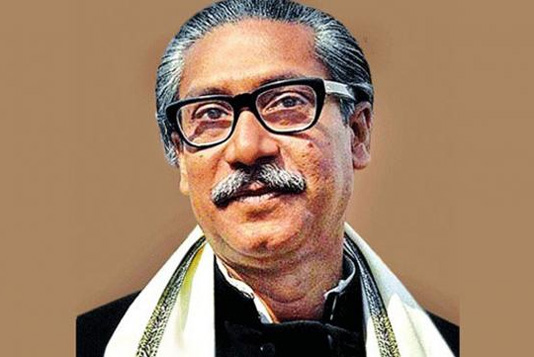By Sajjad Hossain Sabuj and Tanzim Anwar
DHAKA, Aug 13, 2020 (BSS)- Father of the Nation Bangabandhu Sheikh Mujibur
Rahman demonstrated his farsightedness and boldness in adopting Bangladesh’s
foreign policy that brightened the country’s image in the outside world.
Immediately after returning home on January 10 in 1972, Bangabandhu
requested the then Indian prime minister Indira Gandhi to take back their
troops from Bangladesh at the fastest possible time.
“Responding to the request, the Indian government withdrew their soldiers
from Bangladesh’s soil by March 12 in 1972 … such an incident was rare in
the world and it had been possible for Bangabandhu’s bold and independent-
minded leadership,” Prime Minister Sheikh Hasina told the Jatiya Sangsad
earlier.
The prime minister said Bangabandhu signed the historic “Land Boundary
Agreement (LBA)” with the then Indian premier Indira Gandhi on May 16 in 1974
to settle the 65-year-old land boundary dispute between the two next-door
neighbours.
Bangladesh quickly ratified the agreement in that year but India failed to
do so. Indian parliament, however, unanimously passed the LBA on May 7 in
2015, 41 years after its ratification by Bangladesh, ending the 65-year
ordeal of the enclave people of both countries.
Bangabandhu enacted “The Territorial Waters and Maritime Zones Act” to
establish Bangladesh’s sovereign rights in the sea. The law was framed in
1974 when there was no such a law in most of the countries in the world.
Nearly eight years after the enactment of “The Territorial Waters and
Maritime Zones Act” by Bangabandhu, the United Nations (UN) framed “The UN
Convention on the Law of Sea (UNCLOS)” in 1982.
Due to Bangabandhu’s strong diplomatic efforts, Bangladesh earned
recognition of 116 important countries.
Besides, Bangladesh got the membership of the UN, the Commonwealth, the
Organisation of Islamic Cooperation (OIC), the Non-Aligned Movement (NAM),
the International Monetary Fund (IMF), the World Bank, the International
Telecommunication Union (ITU), the World Health Organisation (WHO), the
International Labour Organisation (ILO) and some other international bodies.
The Asian Peace Conference was held in Dhaka on May 23 in 1973 under the
auspices of World Peace Council where Bangabandhu was conferred “Joliot Curie
Award”.
“Bangabandhu had set the cardinal principal of our foreign policy –
friendship to all and malice towards none – and we are still observing and
maintaining it,” foreign minister Dr A K Abdul Momen told BSS today.
Noting that during Bangabandhu’s time the world was divided into two
blocks — Western and Soviet — Momen said “after our independence, there was
a natural global expectation by certain quarter that Bangabandhu will join
the Soviet block for their strong support during our War of Liberation, but
Bangabandhu did not join there (Soviet block) – rather he had joined the non-
aligned platform”.
“Bangabandhu had adopted the non-aligned policy as he understood the
reality of the world and need for Bangladesh,” Moment said adding that the
main spirit of our ‘balancing foreign policy’ till date is inspired by the
Bangabandhu’s diplomatic prudence.
As like Father of the Nation, he said, Bangabandhu had stabilized the
country within only three and a half years by achieving recognition from
around 130 counties. “It was not a simple job,” the foreign minister said.
Momen said Bangabandhu had showed his diplomatic acumen by attending NAM
and OIC conferences in where he presented Bangladesh as a sovereign and
independent country with a vision of peace across the globe.
“Bangabandhu had dreamt of building Bangladesh as like a peaceful non-
aligned country of Switzerland … we have still been following his
diplomatic dictates and we are proud of it,” Momen said.
The foreign minister also recalled Bangbandhu’s high astute in negotiation
with India on different issues including land boundary, water sharing and
friendship treaty.
He said the present government has given emphasis on economic diplomacy and
it was also derived by Bangabandhu’s foreign policy and “currently, we are
following the same thing (Bangabandhu’s economic diplomacy) we are following
what he wanted to do.”
Whenever he addressed the international forums like the UN, NAM,
Commonwealth or the OIC, the Father of the Nation declared in strong voice
his non-aligned foreign policy.
Bangabandhu delivered his historic speech in Bangla at the UN General
Assembly in New York on September 25 in 1974 where he highlighted the main
characteristics of his foreign policy. He had said that from the beginning
Bangladesh undertook the non-aligned foreign policy on the basis of a policy
— “maintaining peaceful coexistence and friendship with all”.
Bangabandhu in his speech said: “Only the peaceful environment could make
us able to enjoy the fruits of the hard-earned national independence and
gather our all strength and resources to fight poverty, hunger, disease,
illiteracy and unemployment. From this concept, our commitment towards peace
was born.”



